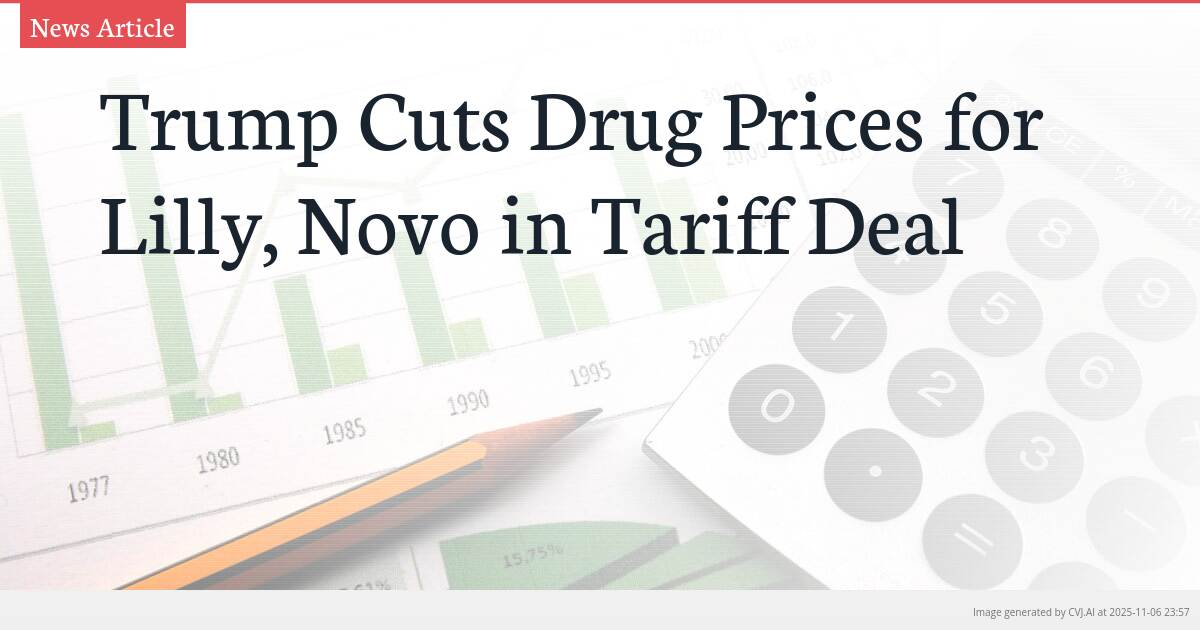This summary text is fully AI-generated and may therefore contain errors or be incomplete.
Introduction
The Trump administration has reached a landmark agreement with Eli Lilly and Novo Nordisk to reduce prices for their popular weight-loss medications. In exchange, the pharmaceutical giants will receive tariff relief and expanded Medicare access. President Trump announced the deal from the Oval Office, highlighting his administration’s efforts to lower healthcare costs.
Key Points
- Three-year tariff exemption on pharmaceutical imports for participating companies
- Expanded Medicare coverage for weight-loss drugs at reduced patient costs
- Direct Oval Office announcement by President Trump emphasizing healthcare affordability
A Strategic Compromise on Drug Pricing
The agreement between the Trump administration and pharmaceutical leaders Eli Lilly & Co. and Novo Nordisk A/S represents a carefully negotiated compromise that addresses multiple policy objectives simultaneously. Under the terms announced from the Oval Office, the two companies will significantly reduce prices for their weight-loss drugs while receiving substantial benefits in return. This arrangement demonstrates how the administration is pursuing healthcare cost reduction through direct negotiation with major drug manufacturers rather than through legislative mandates or regulatory enforcement.
The core of the deal centers on reciprocal concessions: the pharmaceutical companies gain protection from upcoming trade measures and expanded market access, while the government achieves lower drug prices for Medicare beneficiaries. This approach reflects the administration’s preference for bilateral agreements that deliver tangible results without the complexity of broader healthcare reform. The announcement from President Trump himself underscores the political significance of demonstrating progress on drug pricing, a persistent concern for American consumers and a frequent target of political rhetoric.
Three-Year Tariff Relief as Key Incentive
Central to the agreement is the three-year grace period from forthcoming duties on pharmaceutical imports that Eli Lilly and Novo Nordisk will receive. This tariff relief provides significant financial protection for the companies at a time of increasing trade tensions and potential import restrictions. The exemption shields their weight-loss drug operations from cost increases that would otherwise be passed along to consumers or absorbed as reduced profit margins.
The timing and duration of this relief—spanning three years—suggests both companies sought sufficient runway to adjust their supply chains and manufacturing processes should tariffs eventually be implemented. For the Trump administration, this concession represents a targeted use of trade policy as leverage in healthcare negotiations, demonstrating how different policy tools can be coordinated to achieve domestic objectives. The arrangement avoids broader tariff exemptions that might undermine the administration’s trade strategy while providing specific relief where it facilitates other policy goals.
Expanded Medicare Access at Reduced Costs
The other major component of the agreement involves making the companies’ weight-loss drugs available to certain Medicare patients at lower costs. This expansion of coverage addresses longstanding limitations in Medicare’s approach to weight management medications, potentially making these treatments accessible to millions of additional Americans. The reduced pricing structure represents a significant concession from Eli Lilly and Novo Nordisk, who have faced mounting political pressure over the high cost of prescription drugs.
For Medicare beneficiaries, the agreement could transform access to advanced weight-loss therapies that were previously cost-prohibitive for many. The specific patient groups that will qualify for the reduced pricing and the extent of the price reductions were not detailed in the initial announcement, leaving implementation details to be worked out between the companies and Medicare administrators. However, the commitment to expanded access at lower costs aligns with the administration’s broader messaging about making healthcare more affordable for American seniors.
Broader Implications for Pharmaceutical Industry
The Eli Lilly and Novo Nordisk agreement establishes a potential template for future negotiations between the Trump administration and other pharmaceutical manufacturers. By demonstrating that companies can secure favorable trade terms in exchange for price concessions, the deal may encourage similar arrangements across the industry. This approach allows the administration to claim progress on drug pricing without resorting to more confrontational measures like price controls or compulsory licensing.
The focus on weight-loss drugs specifically reflects both the growing market for these treatments and their high visibility among consumers. As obesity rates continue to rise in the United States, effective pharmaceutical interventions have become increasingly important to public health outcomes. The agreement suggests the administration recognizes both the clinical value of these medications and the political benefit of making them more affordable. How this model might apply to other drug categories—particularly those for chronic conditions like diabetes, heart disease, or cancer—remains to be seen, but the precedent set by this deal could influence future healthcare policy negotiations.
📎 Read the original article on bloomberg.com

